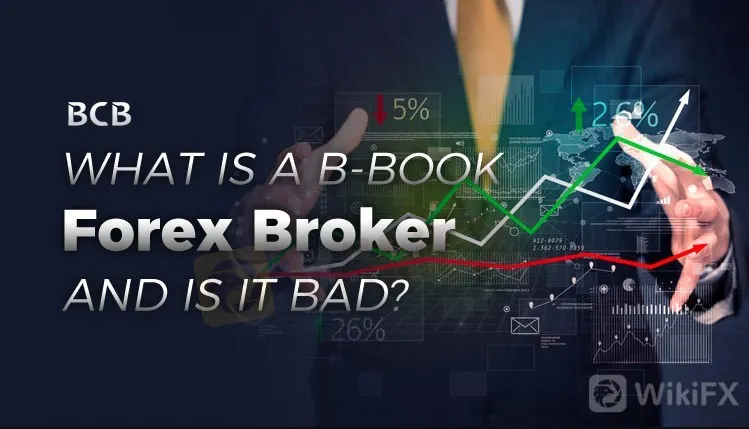简体中文
繁體中文
English
Pусский
日本語
ภาษาไทย
Tiếng Việt
Bahasa Indonesia
Español
हिन्दी
Filippiiniläinen
Français
Deutsch
Português
Türkçe
한국어
العربية
FOREX: WHO GETS THE RULE? BOOK A broker or Book B Broker?
Abstract:Your Forex broker can keep your deals "in-house." This indicates that your trades are not sent to the real market. Instead, your broker takes the opposite side of the trade, betting against you.
Not Many Traders Consider How Their Orders Are Executed When Trading. Some Traders Consider Profit Potential, Leverage, and Other Trading Conditions. Once a trade is executed, the only thing a trader cares about is whether or not the trade results in a Profit. For most traders, A Book or B Book may appear to be technical jargon, but it is the only way to determine which brokers profit from customers and which do not, as well as who controls the Forex market.
WHO IS A BOOK BROKER?
A Book in forex is defined as a STP or Straight through Processing execution methodology. You may have encountered forex brokers who refer to themselves as STP brokers, ECN brokers, or non-dealing desk brokers.
This means that a broker operating under this paradigm transmits your orders directly to the liquidity pool. A liquidity pool is a collection of businesses that act as counterparties to the trades executed by your forex broker.
This is the price you pay when opening and closing a job.
A book forex brokers do not operate as your counterparty. For many traders, this is the most important factor: the ability to trade with a broker who does not have a conflict of interest while executing your orders.
WHO ARE B BOOKBROKERS?
It is a B book when a forex broker handles your trades internally (with a dealing desk). In the event of a B Book, your forex broker acts as the counterparty to your trades. The B book broker is also known as a market maker or a fixed spread broker. While this may be true, a B book forex broker offers a number of benefits. First, you can receive guaranteed trade fills. Even when liquidity is limited, your orders are executed efficiently since your broker is the market maker.
Remember that a B book forex broker offers set spreads. This means that whether you trade during peak market hours or off-market hours, a B book forex broker is superior.
When opening or closing a position, B book forex brokers often charge a predetermined spread. This again has advantages and disadvantages. First, having stable spreads facilitates trading during market fluctuations.

Which is superior? WHO MAKES MORE MONEY?
This depends on your trading objectives. For instance, if you reside in a time zone where the rest of the globe is typically asleep when your business day begins, a B book forex broker with set spreads is preferable.
Trading with an A book broker is preferable if you are in a very active time zone, such as the European trading session. Due to greater liquidity, you are more likely to obtain the greatest potential spreads. In such circumstances, it is best to determine which of the two execution models is optimal for you. This enables you to make a more informed choice when selecting a forex broker.
Whether it's an A book or a B book, you cannot trade without a counterparty. The question is if you perceive any distinct advantage between the two execution methods, and it goes without saying that the B Book Brokers dominate the market. This certainty is unparalleled.
Disclaimer:
The views in this article only represent the author's personal views, and do not constitute investment advice on this platform. This platform does not guarantee the accuracy, completeness and timeliness of the information in the article, and will not be liable for any loss caused by the use of or reliance on the information in the article.
Read more

Why More People Are Trading Online Today?
Discover why online trading is booming with tech, AI, and a push for financial freedom. From stocks to crypto, it’s a thrilling hustle for all.

Bitpanda Secures Full Broker-Dealer License in Dubai
Bitpanda has officially obtained a full broker-dealer license from the Dubai Virtual Assets Regulatory Authority (VARA), marking a significant milestone in its international expansion. This approval, which follows preliminary authorization granted three months earlier, enables the European digital asset exchange to introduce its comprehensive suite of virtual asset services to investors in the United Arab Emirates (UAE).

RM457,000 Forex Fraud: Court Grants Conditional Release, Is Justice Delayed?
A Malaysian magistrate’s court has issued a discharge not amounting to acquittal (DNAA) for two former directors of an investment company implicated in a forex investment fraud case involving RM457,735.50.

Interactive Brokers Expands Crypto Trading with Solana, XRP, Cardano, and Dogecoin
Interactive Brokers adds Solana, XRP, Cardano, and Dogecoin to its platform, enabling U.S. and U.K. clients to trade crypto 24/7 with low fees.
WikiFX Broker
Latest News
Enlighten Securities Penalized $5 Million as SFC Uncovers Risk Control Failures
Why Are Financial Firms Adopting Stablecoins to Enhance Services and Stability?
Experienced Forex Traders Usually Do This Before Making a Lot of Money
Octa vs XM:Face-Off: A Detailed Comparison
When High Returns Go Wrong: How a Finance Manager Lost RM364,000
Bridging Trust, Exploring Best—WikiEXPO Hong Kong 2025 Wraps Up Spectacularly
Fidelity Investments Explores Stablecoin Innovation in Digital Assets Sector
Interactive Brokers Expands Crypto Trading with Solana, XRP, Cardano, and Dogecoin
SEC Ends Crypto.com Probe, No Action Taken by Regulator
Why More People Are Trading Online Today?
Currency Calculator







